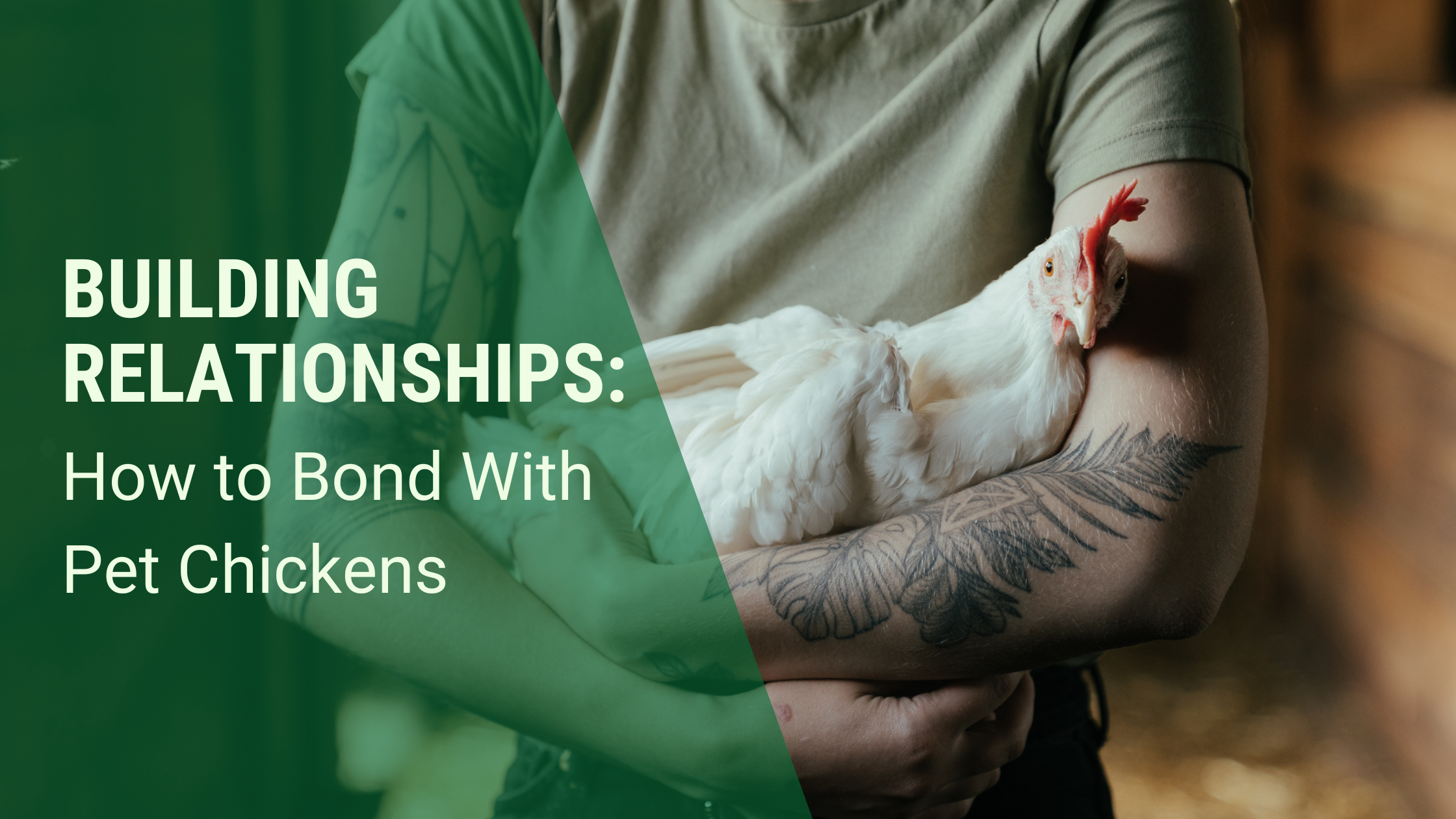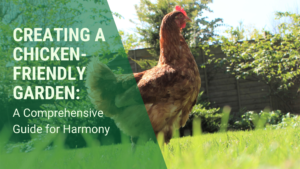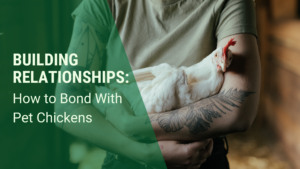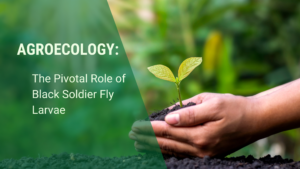Whatever your reasons for getting chickens – whether you’re egg orientated, an all-around animal lover, or looking for family pets with lots of learning opportunities and reasons to connect with nature – you’ll find that with all relationships, you get out what you put in.
So, if you’re asking yourself how to bond with pet chickens, we’re here to give you some expert tips. The secret, dear reader, is in the word ‘enrichment’, a somewhat stuffy term you usually find printed in animal welfare literature and textbooks. But don’t be fooled – enrichment is where the fun really begins!
At its core, enrichment is about promoting specific behaviours valuable to our chickens. Our flocks exhibit a variety of antics and habits based on their interests, environment, and even their reproductive status. Like you or me, every chicken is an individual, full of personality and quirk.
Okay, now you’re probably wondering, ‘But how can I enrich my chicken’s life?’ Well, the good news is that there are countless ways to engage, educate, and amuse our chickens – and by doing so, we form a hard-to-break bond with them.
First off, let’s talk about occupational enrichment.
No, this doesn’t mean hiring your chicken to handle your emails (though wouldn’t that be nice!). This is about activities that engage your chicken mentally: problem-solving tasks, simple learning games, and exploring new additions to their environment.
And then, there’s visual enrichment.
Chickens have a stellar sense of sight! Different light colours can even affect how much time chickens spend walking versus sitting. Hang some colourful streamers, shiny bells, or mirrors in their run – you’ll have a chicken rave in your garden in no time!
Auditory enrichment, as well
This a handy tool for stimulating your chickens and forming bonds with them. So what if the neighbours think you’re a bit crazy for nattering away to your chickens or creating some ambience with a coop radio? What your chickens feel about you is way more important!
Let’s remember social enrichment.
Chickens are, after all, social creatures and thrive in the company of others. Friendships aren’t just for the humans! We want to encourage social connections in our chicken flocks, too.
So, you see, there’s so much more to keeping chickens than feeding them and collecting eggs. Indeed, there’s a whole world of bonding with these fascinating creatures if you open your eyes and mind to the possibilities. And trust us, your efforts won’t go unnoticed. Chickens are exceptionally intelligent and highly aware of their environment. By enriching their lives, you develop relationships and become part of their world.
Read more about chicken enrichment activities in our guide.
The Art of Chicken Communication: A Primer for bonding
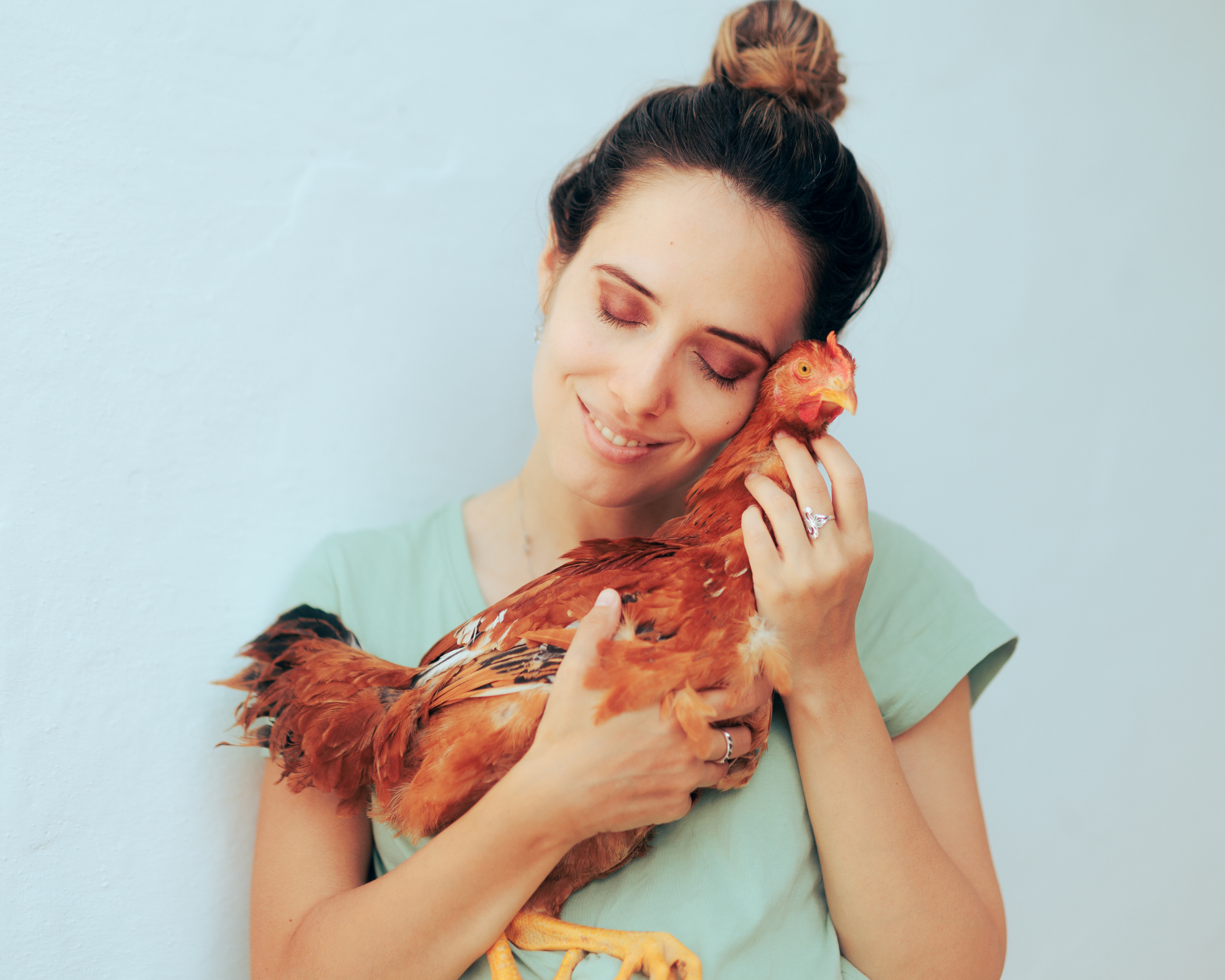
Chickens are social animals that can form strong bonds with humans. Understanding and responding to chicken behaviour and communication can significantly enhance your bond. Chickens have a complex social structure and a variety of vocalisations, each with different meanings. By learning to interpret these, you can communicate more effectively with your flock and meet their needs more accurately.
Talking softly to your chickens can help calm them and build a bond. Chickens are known to respond to human voices, and talking to them calmly and gently can help to soothe them and build trust. You can talk to them while feeding, handling, or spending time in the garden.
The Importance of Consistent Routines in Bonding
Chickens in the UK are protected by the Animal Welfare Act 2006, which requires owners to provide a suitable environment and diet. Creating a safe and comfortable environment for your chickens is another key to bonding. This includes providing a clean coop, fresh water, a balanced diet with abundant resources to prevent squabbles, and protection from predators. When chickens feel safe and secure, they are more likely to respond positively to human interaction. Chickens also enjoy exploring and foraging and need to satisfy these natural instincts. Providing a stimulating environment can help keep them happy.
Quality Time with Your Flock: Making the Most of It
Spending time with your chickens can help build trust and familiarity. Regularly sitting or walking among them makes them accustomed to your presence and voice. Over time, they will recognise you as a non-threatening entity and look forward to your visits. Spending quality time with your chickens is another crucial activity. This can involve simply sitting with them in the garden, observing their behaviour, and allowing them to get used to your presence. Over time, they will become more comfortable around you, and this can strengthen your bond.
Chickens and Children: A Unique Bonding Opportunity
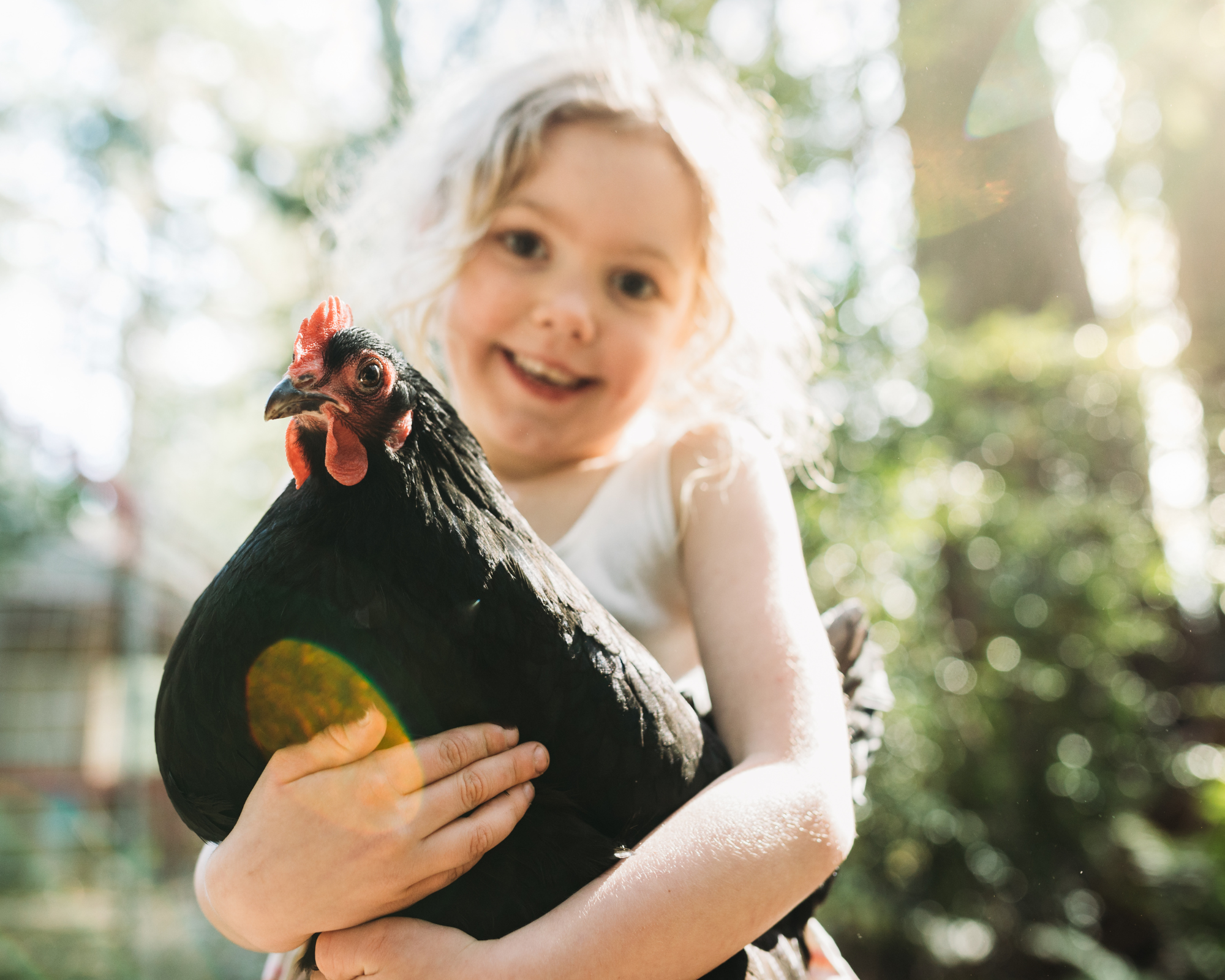
“Bet you a tenner. I know what you’re thinking—are chickens and kiddos really a good mix?” Well, let us tell you something: They are not just a good mix; they are phenomenal together!
Children have this incredible knack for bonding with animals. Their genuine curiosity, innocent playfulness, and untamed energy can create a harmonious symbiosis with your flock. Chickens, notably sociable creatures, are drawn to children’s lively energy. Plus, it’s a two-way street; children can learn vital life lessons such as responsibility, compassion, and the importance of caregiving, all while nurturing a unique bond with their feathery friends.
To crack on with this bond forming, we must introduce our chicks to the children gently and gradually. Start with supervised interactions, allowing the chickens to get used to the children and vice versa. Over time, as your garden chickens grow comfortable with the children, they’ll begin to recognise them as one of their own — part of the flock.
Chickens are living beings with needs, wants and feelings, just like you and I… They deserve to be treated with kindness and respect.
Ingrid Newkirk
Feeding Time: a surefire way to bond with pet chickens
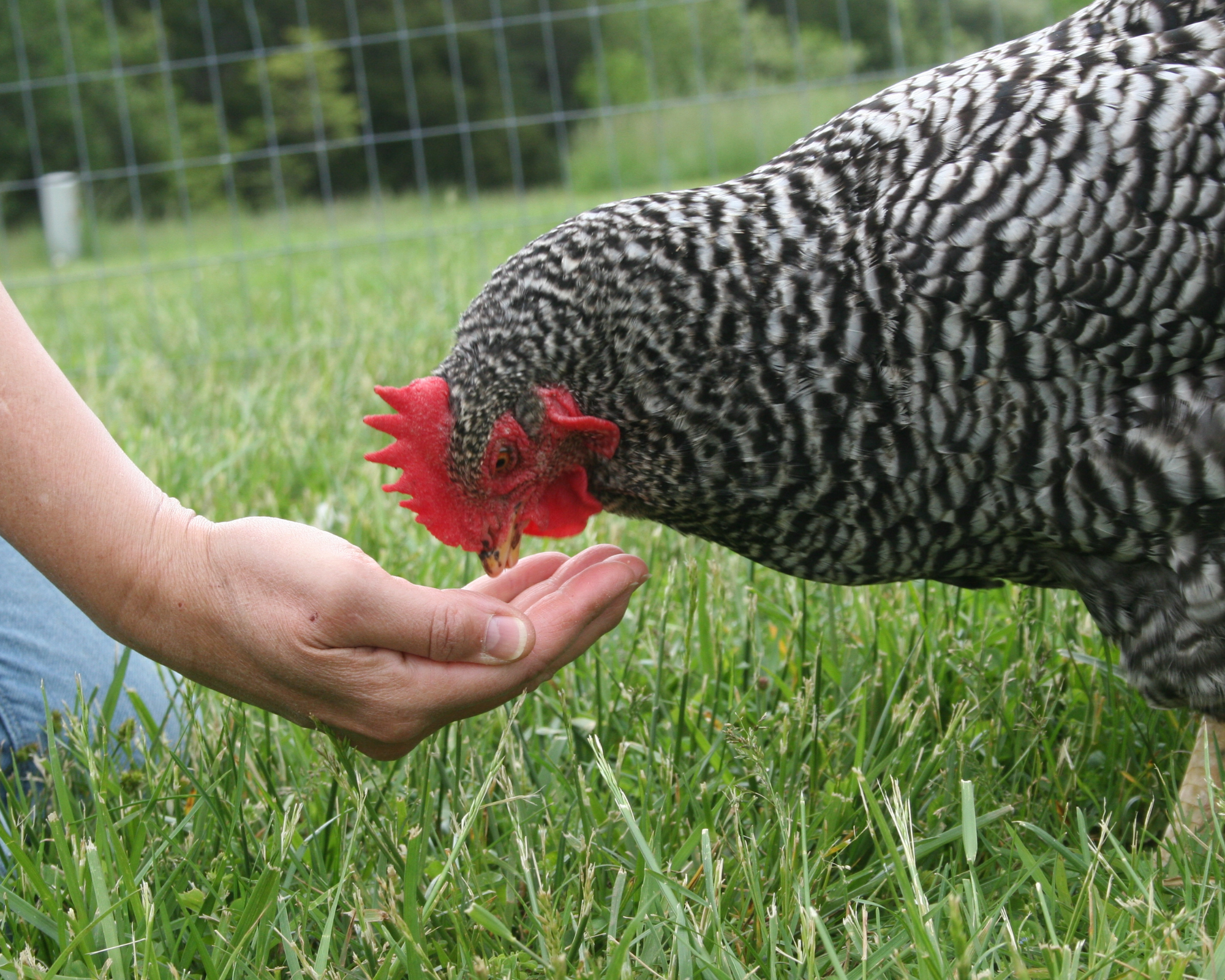
Regular feeding is one of the most effective ways to bond with your garden chickens. Chickens quickly associate their caretakers with food, which can be a great way to build trust. To encourage this bond, you can hand-feed them treats such as Calci Worms, fruits, seeds or vegetables. However, remember to feed them a balanced diet and not to overdo it with treats. A balanced diet ensures their health and encourages them to associate positive experiences with your presence.
Utilising Treats and Toys: Fun Ways to Bond Through Chicken Training
Chickens are naturally curious animals, and providing them with toys can help stimulate their minds. Games and activities, like chicken treasure hunts for treats, rotating stimulating coop toys and activities to prevent boredom, and enjoying a run around the garden with other pets, children, or adult human companions, help breathe some fresh vigour into your chickens.
Chickens can also be trained to respond to certain sounds or commands, which can be a great way to bond with them. This can involve teaching them simple commands or tricks, such as coming when called, and is usually achieved with positive reinforcement. For example, you could reward them with treats when they respond to their names or follow simple commands. Over time, this can lead to increased trust and interaction.
This mentally stimulates your chickens and strengthens your bond as they learn to trust and respond to you. We have a blog about training chickens and how they naturally engage in a behaviour called “contra freeloading”:
“It’s in no way teasing or unkind to hide treats from chickens or make them work for them – they prefer to work for their supper. Many animals engage in feeding behaviour called contrafreeloading, Which means that they prefer to perform tasks for food even when that same food is freely available. Cat owners may not be surprised to learn that domestic cats are one of the few species that don’t exhibit contra freeloading…”
ECOnourish customers have had great success using our larvae for training. They’re a genuinely high-value treat for your chickens, providing the perfect impetus for their best performance. From training your chickens to flock back into the run to acrobatics like little lavender in this sweet video by Eggs And Fluff, which went viral last month!
Handling: A Crucial Aspect of Bonding
Cuddling a chicken is a huge perk of chicken ownership, and chickens often enjoy being petted, especially on the back and under their wings. But unless your chickens are comfortable being handled, they won’t want a cuddle. Building up to physical contact is essential to ensure your chickens feel safe and trust you enough to allow for contact. Cuddles aren’t the only aim of encouraging your flock to tolerate handling – regular health checks are critical to ensure your flock’s health and wellbeing.
Stress-Free Handling: A Gentle Approach
Chickens are generally not fond of being picked up. Still, if done gently and consistently, they can become comfortable with it. This can be especially effective when they are chicks, as they will grow up being used to human touch.
Handling your chickens gently and regularly can also help to establish a bond. This should be done carefully, as chickens can be sensitive to touch. Start by gently stroking them when calm and relaxed, gradually increasing handling over time. This can help to build trust and make your chickens more comfortable around you.
Bonding with Chickens: The Rewards and Challenges
There’s no doubt that the rewards of bonding with your chickens are plentiful. After weeks (or even months!) of tentative hand-feeding, cautious petting, and soft clucking, the moment when a chicken finally hops onto your arm or, better yet, voluntarily cuddles up, it certainly feels like winning the National Lottery. You’ve earned their trust; now they’re part of the family, too!
One crucial thing to remember is that this bonding process takes time. Like other animals, chickens require time to adjust and develop a comfort level, especially when dealing with humans. Can you blame them, really? We are a rather odd giant species from their point of view! Your patience and consistency will pay off — it’s a promise from one chicken enthusiast to another.
Unfortunately, there are unique challenges that come with this territory. Unlike our canine companions, you can’t rely on a wagging tail to discern a chicken’s mood. You’ll need to be on high alert for changes in their behaviour, body language, or eating habits, often indicating health issues or stress. Also, some hens might be overly assertive or too independent (yes, they only sometimes need us as much as we need them!).
Remember, creating bonds with our feathered friends is not solely for fun and frolics. Yes, the Instagram posts with you and your buddies fluffing their feathers are nothing short of infectious, but pat yourself on the back because it’s more than that. You’re ensuring their welfare and enriching their lives. Isn’t it fascinating to imagine that on opening the coop gate each morning, you’re not just feeding chickens but fostering an environment of love, learning, and mutual respect? What a fantastic way to start the day!
So, whether you’re out there in your wellies, rain or shine, remember this – it’s a lot like the proverbial chicken and egg scenario. The more you invest, the more you will get back. And honestly, who wouldn’t want a winning lottery ticket in the form of feathery, egg-laying friends?
Why not make life and flock bonding a little easier by satisfying many of your chickens’ needs with one wriggly solution? Our Calci Worms are perfect for stimulating their natural instincts, taking care of their health and nutrition, and providing a high-value treat for bonding, handling, and training. Order them from our online shop for next-day delivery so you can get started reaping the rewards immediately.

